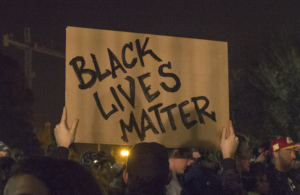A Black Lives Matter activist is awaiting a final judgment for her lawsuit against the Metropolitan Police Department to obtain documents to prove unlawful police surveillance after a Feb. 8 hearing.
April Goggans, a core organizer of Black Lives Matter D.C., first reported experiencing police surveillance in 2015, according to DCist. Goggans said she was followed over the course of several weeks, watched from outside of her home and stopped by MPD.

Goggans is seeking the release of documents relating to her surveillance through the Freedom of Information Act, a federal law allowing an individual to request access to government agency records. Goggans began submitting FOIA requests to MPD after these incidents, eventually filing a lawsuit in November 2017 when the requests were not met.
MPD has declined to turn over documents that have to do with monitoring Goggans, asserting that Goggans’ speculation does not constitute a valid reason for their release. However, the department has confirmed it possesses 9,000 pages of documents containing Goggans’ address, Twitter handle and documents referring to two different spellings of Goggans’ last name, according to DCist.
D.C. Superior Court Judge William Jackson presided over the Feb. 8 summary judgment hearing, which was held to determine if MPD must provide Goggans with access to the documents. Jackson did not provide an immediate ruling on the lawsuit, with an additional hearing scheduled for April 5.
A representative from the MPD declined to comment on the issue, citing the MPD’s policy of not commenting on pending litigation.
New York Black Lives Matter activists also reported cases of unlawful police surveillance beginning in 2014 and claim the New York Police Department has been using social media software and undercover officers to monitor members of the group, according to The New York Times.
During Black Lives Matter protests after the deaths of Eric Garner and Michael Brown, two unarmed black men who were both killed by police officers in 2014, protesters reported their phones were losing reception and switching off, leading them to believe that police were using technology to intercept their communications.
The NYPD refused to confirm or deny whether the records requested by BLM activists existed. After a New York Supreme Court judge ruled that the NYPD had to disclose whether or not they interfered with protesters’ cell phones, NYPD responded that it did not disrupt constitutionally protected activities and would review the decision before moving forward.
Washington, D.C. citizens should encourage their councilmembers and D.C. Mayor Muriel Bowser (D) to compel the MPD to be more transparent about police surveillance, Natacia Knapper, police accountability organizer of D.C.’s chapter of the American Civil Liberties Union, wrote in an email to The Hoya.
The ACLU has previously worked in conjunction with Black Lives Matter on an information request toward the MPD alongside the Stop Police Terror Project DC, an organization that seeks to combat racialized and militarized policing tactics according to their mission statement. To obtain information, the three organizations requested documents through the Freedom of Information Act.
Activists need to continue to fight for protections for free speech in order to allow for marginalized voices to be heard, Knapper wrote.
“We’re gratified that robust activism, led by groups like Black Lives Matter, continues today, and we’ll continue to work with them and other groups through our own advocacy and litigation to ensure government actions against free speech remain checked,” Knapper wrote in an email to The Hoya. “For our democracy to thrive, we need to hear all voices, not just the voice of the powerful.”
Modern technology presents new problems for black activists to adapt to, Nile Blass (COL ’22), freshman representative for the Georgetown Black Student Alliance, said in an interview with The Hoya.
“It’s not necessarily a surprise so much as it is interesting to see distrust and suspicion of black and pro-black activism to be weaponized in modern ways,” Blass said. “It’s always been a danger to be black and opinionated so I hesitate to think whether this is an escalation of the danger that already exists for black activists or just a facet of it that has to be adapted to.”
Government surveillance of civil rights activists dates back through the 1950s when the Federal Bureau of Investigation’s surveillance of Rev. Martin Luther King Jr. and other civil rights activists was conducted under the FBI Counterintelligence Program, COINTELPRO.
The Counterintelligence Program began in 1956 and was initially established to disrupt the activities of the Communist Party of the United States, according to the FBI’s website. By the 1960s, the program was expanded to include a number of other domestic groups including the Black Panther Party, the Socialist Workers Party and the Klu Klux Klan. The program was criticized by the U.S. Congress for abridging First Amendment rights and ended in 1971.
The suspicion of unlawful surveillance could act as a potential deterrent for activists, according to Knapper.
“When activists see local or federal law enforcement conducting this type of surveillance, it chills First Amendment-protected speech,” Knapper wrote. “It makes those who would speak out hesitate, and makes them wonder: ‘Will I be targeted next?’”



















